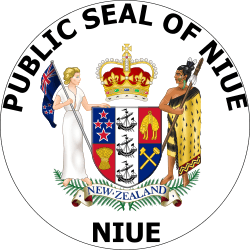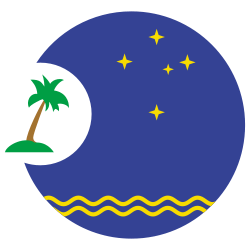Politics of Niue
 |
| This article is part of a series on the politics and government of Niue |
Politics of Niue takes place in a framework of a parliamentary representative democratic dependency, whereby the Chief Minister is the head of government, and of a multi-party system. Niue is self-governing in free association with New Zealand and is fully responsible for internal affairs. New Zealand retains some responsibility for external affairs, in consultation with Niue. The Niue Constitution Act 1974 (NZ) vests executive authority in Her Majesty the Queen in Right of New Zealand and the Governor-General of New Zealand. The constitution specifies that in everyday practice, it is exercised by a Cabinet of the Premier of Niue and three other ministers. The premier and ministers must be members of the Niue Assembly, the nation's legislative assembly. The Judiciary is independent of the executive and the legislature.
Executive branch
| Office | Name | Party | Since |
|---|---|---|---|
| Monarch | Elizabeth II | 6 February 1952 | |
| Governor General | Jerry Mateparae | 31 August 2011 | |
| Premier | Toke Talagi | Independent | 19 June 2008 |
| Governor General-designate | Patsy Reddy | 14 September 2016 |
The monarch is hereditary; her representative in relation to Niue (the Governor-General of New Zealand) is appointed by the monarch. The New Zealand high commissioner is appointed by, and acts solely as a diplomatic agent of, the New Zealand Government. The cabinet is chosen by the premier and appointed by the Speaker of the Niue Assembly and collectively responsible to Parliament.
Legislative branch
The Assembly has 20 members elected for a three-year term, 6 elected on a common roll and 14 representatives of the villages. Electors must be New Zealand citizens, resident for at least three months, and candidates must have been electors, resident for twelve months. The speaker is elected from among the members.
Political parties and elections
In Niue, political parties have never played an important role. There is, at present, no political party, and candidates to elections therefore run as independents. The only party ever to have existed, the Niue People's Party, disbanded in 2003.
As there are no political parties, there is no formal parliamentary Opposition, though there are MPs who oppose the government.
Latest election
| Members | Seats |
|---|---|
| Non-partisan members elected on a common roll | 6 |
| Representatives of the villages | 14 |
| Total (turnout %) |
Past elections and referendums
By-elections
Below is a list of recent by-elections:
| Election | Date | Reason | Winner |
| 1988 Common Roll by-election | November 1988 | O'Love Jacobsen | |
| 1997 Common Roll by-election | 15 February 1997 | Death of Toeono Tongatule | Billy Graham Talagi |
| 2003 Common Roll by-election | 30 August 2003 | Death of Hunukitama Hunuki | Krypton Okesene |
| Toi by-election, 2012 | 31 March 2012 | MP disqualified due to improperly administered oath | Dion Taufitu |
Judicial branch
The Judicial Committee of the Privy Council sitting in the United Kingdom is Niue's highest court. On the island, there is a Court of Appeal (which sat in New Zealand until 2009), and the High Court of Niue.[1]
The current chief justice is Patrick Savage. Previous chief justices include Gaven Donne (1975–1982) and Heta Kenneth Hingston, who served as such for 14 years prior to Patrick Savage.
Administrative divisions
Niue is divided in 14 villages each with its own village council whose members are elected and serve three-year terms.
International organization participation
ACP (Cotounu Convention), ESCAP (associate), Intelsat (nonsignatory user), PIF, Sparteca, SPC, UNESCO, WHO, WMO
Local government
Local Government in Niue is established under the provisions of the Niue Village Council Act 1967. Every village in Niue have a Village council, the term in office is three years before going back to the polls. The election of the members of the village council follows the same rules and regulations used in the General Election to elect members of the Niue Legislative Assembly (parliament). At the first meeting of the Village Council the Chairman will be elected, including the Deputy Chair and the appointment of the Secretary/Treasurer. The Village Council receives grants from the Government, donor agencies also fund some development projects. The Council use to organize show days and conduct fundraising activities to generate revenue to help run some of the activities of the village.
See also
- Cabinet of Niue
- Electoral calendar
- Electoral system
- Foreign relations of Niue
- List of political parties by country to browse parties by country
References
- ↑ "Niuean criminal court system". Association of Commonwealth Criminal Lawyers. Retrieved 2010-12-29.
